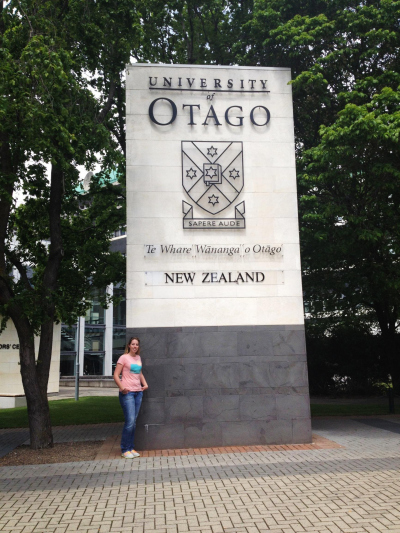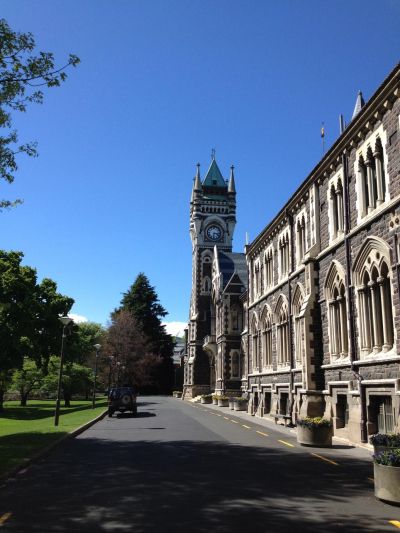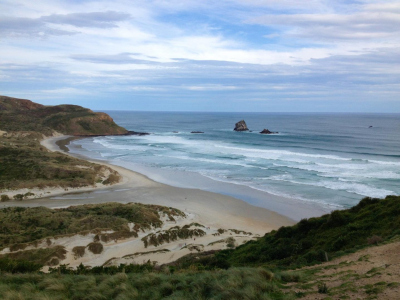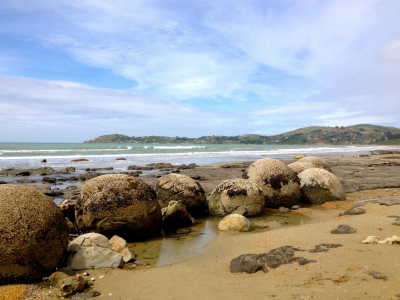Page path:
- Graduate School GLOMAR
- PhD student reports
- Research Placements
- Charlotte Kleint
Charlotte Kleint
Report of GLOMAR PhD student Charlotte Kleint about her research stay at the University of Otago, New Zealand from 16 October - 10 December 2014
From October 16th until December 10th 2014, I conducted my research stay at the University of Otago, New Zealand in the Chemistry Department under the supervision of Prof. Sylvia Sander.
Prof. Sylvia Sander is the director of the NIWA/University of Otago Research Centre for Oceanography and her research is focused on trace metal speciation, organic complexation and electroanalytical methods. Besides modeling of trace metal speciation and developing new analytical methods, her current projects include iron speciation in seawater, as well as organic metal speciation in hydrothermal vents and the characterization of organic metal binding ligands. Since my Ph.D. project focuses on the organic complexation of Cu and Fe at shallow hydrothermal vents, my work strongly intersects with Dr. Sylvia Sander’s research.
In June and July 2013, I collected samples at a hydrothermal vent field off the waters of Vanuatu during SONNE cruise SO-229. By then, I knew already that I want to conduct my research stay at the University of Otago in Sylvia Sanders lab. Due to the proximity to New Zealand, we shipped parts of my samples directly to the Chemistry Department of the University of Otago. Since then, they were waiting to be analyzed.
The work in a totally new lab at the other side of the world was a challenge in the beginning. After one week, though, I felt very comfortable already, got into the daily lab procedures and could start measuring my samples. I got the chance to use a brand new voltammetric machine. Although I worked with the same type of machine already a lot in Bremen, it is always challenging to set up a new device. At the same time, I got to know the details of the equipment and the way it works. Due to a new method development I wasn’t able to measure all samples within the 8 weeks I spent at the University of Otago. I brought the rest of the samples home with me and will continue measuring the remaining ones at Jacobs University Bremen. During these 8 weeks of intense measuring and method development, I learned a lot and my supervisor, Sylvia Sander, gave me helpful insights into the world of electrochemical methods and how important it is to really understand how methods need to be adjusted or newly written for different types of samples.
I would like to thank GLOMAR for funding my research stay and thereby giving me the opportunity to discover the work in a lab at the other side of the world.
Prof. Sylvia Sander is the director of the NIWA/University of Otago Research Centre for Oceanography and her research is focused on trace metal speciation, organic complexation and electroanalytical methods. Besides modeling of trace metal speciation and developing new analytical methods, her current projects include iron speciation in seawater, as well as organic metal speciation in hydrothermal vents and the characterization of organic metal binding ligands. Since my Ph.D. project focuses on the organic complexation of Cu and Fe at shallow hydrothermal vents, my work strongly intersects with Dr. Sylvia Sander’s research.
In June and July 2013, I collected samples at a hydrothermal vent field off the waters of Vanuatu during SONNE cruise SO-229. By then, I knew already that I want to conduct my research stay at the University of Otago in Sylvia Sanders lab. Due to the proximity to New Zealand, we shipped parts of my samples directly to the Chemistry Department of the University of Otago. Since then, they were waiting to be analyzed.
The work in a totally new lab at the other side of the world was a challenge in the beginning. After one week, though, I felt very comfortable already, got into the daily lab procedures and could start measuring my samples. I got the chance to use a brand new voltammetric machine. Although I worked with the same type of machine already a lot in Bremen, it is always challenging to set up a new device. At the same time, I got to know the details of the equipment and the way it works. Due to a new method development I wasn’t able to measure all samples within the 8 weeks I spent at the University of Otago. I brought the rest of the samples home with me and will continue measuring the remaining ones at Jacobs University Bremen. During these 8 weeks of intense measuring and method development, I learned a lot and my supervisor, Sylvia Sander, gave me helpful insights into the world of electrochemical methods and how important it is to really understand how methods need to be adjusted or newly written for different types of samples.
I would like to thank GLOMAR for funding my research stay and thereby giving me the opportunity to discover the work in a lab at the other side of the world.






